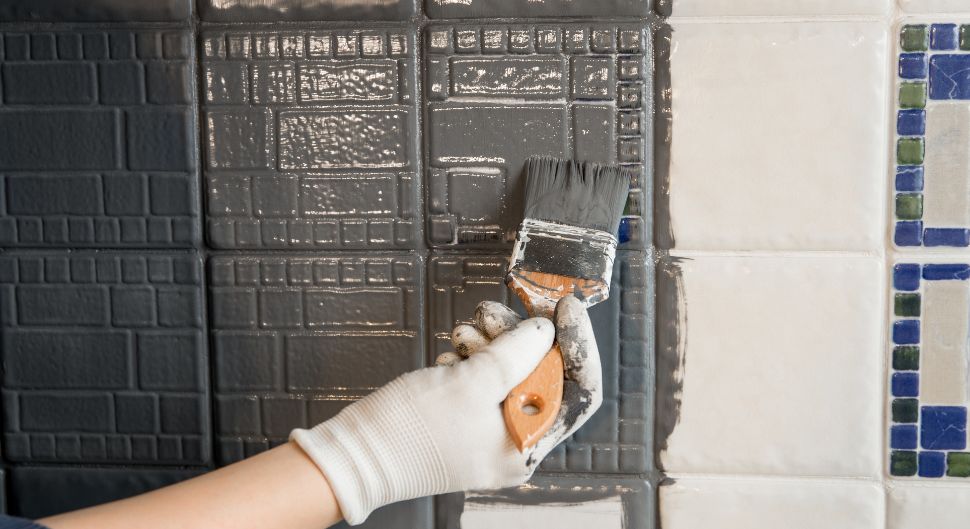Epoxy tile paint is a popular choice for giving new life to your tiles. The advantages of this method lie in its durability and resistance to stains and wear. However, some disadvantages to consider are the thorough preparation required and the higher cost compared to other renovation options.
Epoxy on tiles
[arve url="https://www.youtube.com/embed/Z-BlDpeCGdE "/]
How does epoxy resin age?
Epoxy resin ages in different ways, depending on its use and the environmental conditions to which it is exposed. In general, epoxy resin has excellent durability and weather resistance, enabling it to retain its properties for many years.
However, it's important to note that epoxy resin can change color or texture over time. These changes can be caused by exposure to ultraviolet rays, humidity, extreme temperatures or other environmental factors.
Epoxy resin can also contract and expand in response to temperature variations. This can lead to cracks or breaks if the epoxy resin is applied to a surface that expands or contracts significantly.
To prevent the effects of ageing, we recommend protecting epoxy resin from UV rays by using a protective varnish or avoiding prolonged exposure to the sun. It is also advisable to maintain epoxy resin in optimum temperature and humidity conditions to preserve its quality and durability.
In short, epoxy resin has good resistance to aging, but it can still suffer aesthetic changes and cracking due to environmental factors. It's important to take preventive measures to prolong the life of epoxy resin.
Why use epoxy paint?
Epoxy paint, a popular choice for floor coverings
Epoxy paint has become extremely popular in the flooring sector for a number of reasons. Firstly, epoxy offers exceptional resistance to wear, chemicals, impact and scratches. This makes it an ideal choice for surfaces exposed to heavy traffic, such as garages, warehouses, factories, etc.
What's more, epoxy paint also offers excellent adhesion, meaning it won't chip easily and is capable of withstanding mechanical stress. This makes it a safe and durable choice for industrial, commercial and even residential floors.
Another advantage of epoxy paint is its ease of maintenance. Once applied, the surface becomes smooth and easy to clean. Stains can be easily wiped away with a damp cloth, and there's generally no need to use harsh chemicals to keep the surface in good condition.
Finally, epoxy paint also offers numerous aesthetic possibilities. It is available in a wide range of colors and can be used to create customized patterns or special effects. It can also be combined with other materials, such as glitter or marble chips, to create unique and attractive finishes.
In short, epoxy paint is a popular choice for floor coverings because of its exceptional resistance, ease of maintenance and aesthetic possibilities. Whether for industrial, commercial or residential use, epoxy offers a durable and attractive solution for protecting and beautifying floors.
Is epoxy resin water-resistant?
Yes, epoxy resin is water-resistant. Epoxy resin is a polymeric material that forms a waterproof barrier when cured. It is used in many fields, such as construction, floor repair, furniture manufacture, etc. Thanks to its hydrophobic properties, epoxy resin repels water and resists its absorption. This makes it an ideal choice for projects requiring protection against moisture or exposure to water.
How do I coat epoxy paint?
To coat epoxy paint, it is important to follow a few key steps:
1. Surface preparation : Before starting, make sure the epoxy paint surface is clean, dry and free of any residue or debris.
2. Sanding : Use fine sandpaper to lightly sand the surface of the epoxy paint. This will help create a bond for the new coat of paint.
3. Cleaning : Then clean the surface thoroughly with a suitable degreaser to remove any residual grease or dirt.
4. Primer : Apply a coat of primer compatible with the new paint you wish to use. The primer will help seal the surface and improve adhesion of the new paint.
5. Painting : Once the primer is dry, apply the new coat of paint according to the manufacturer's instructions. Be sure to use a paint that is compatible with the primer and suitable for the surface to be painted.
6. Finish : After applying the new paint, allow the surface to dry completely according to the manufacturer's recommendations. If necessary, apply a second coat of paint to achieve an even, long-lasting finish.
It's important to note that recoating epoxy paint can sometimes be tricky, as the new paint must be compatible with the chemical composition of the existing epoxy paint. It is therefore advisable to consult a professional or carry out preliminary tests to ensure the compatibility of the products used.
In conclusion, epoxy tile paint has both advantages and disadvantages. On the one hand, it breathes new life into our tiles, giving them a fresh, modern appearance. What's more, it offers a wide variety of colors and finishes, allowing us to personalize our space to suit our tastes and needs.
However, it's important to note that epoxy paint can be more complex to apply than other types of coating. It generally requires a thorough preparation process, including tile cleaning and sanding, as well as the application of an appropriate undercoat. What's more, it may be less resistant to knocks and scratches than other surface treatments.
In general, it's essential to consider our needs and constraints before deciding to use epoxy tile paint. If we're prepared to invest time and effort in preparation and application, as well as regularly renewing the coating, then it can be an excellent option for creating a new look in our home. However, if we're looking for a durable, long-lasting solution, it may be preferable to consider other alternatives, such as replacing the tiles or using specific coatings for tiled surfaces.
Ultimately, the choice of epoxy tile paint depends on our aesthetic preferences, budget and durability expectations. It's important to carefully weigh up the pros and cons, and to consult professionals for advice on the best solution for our project.








